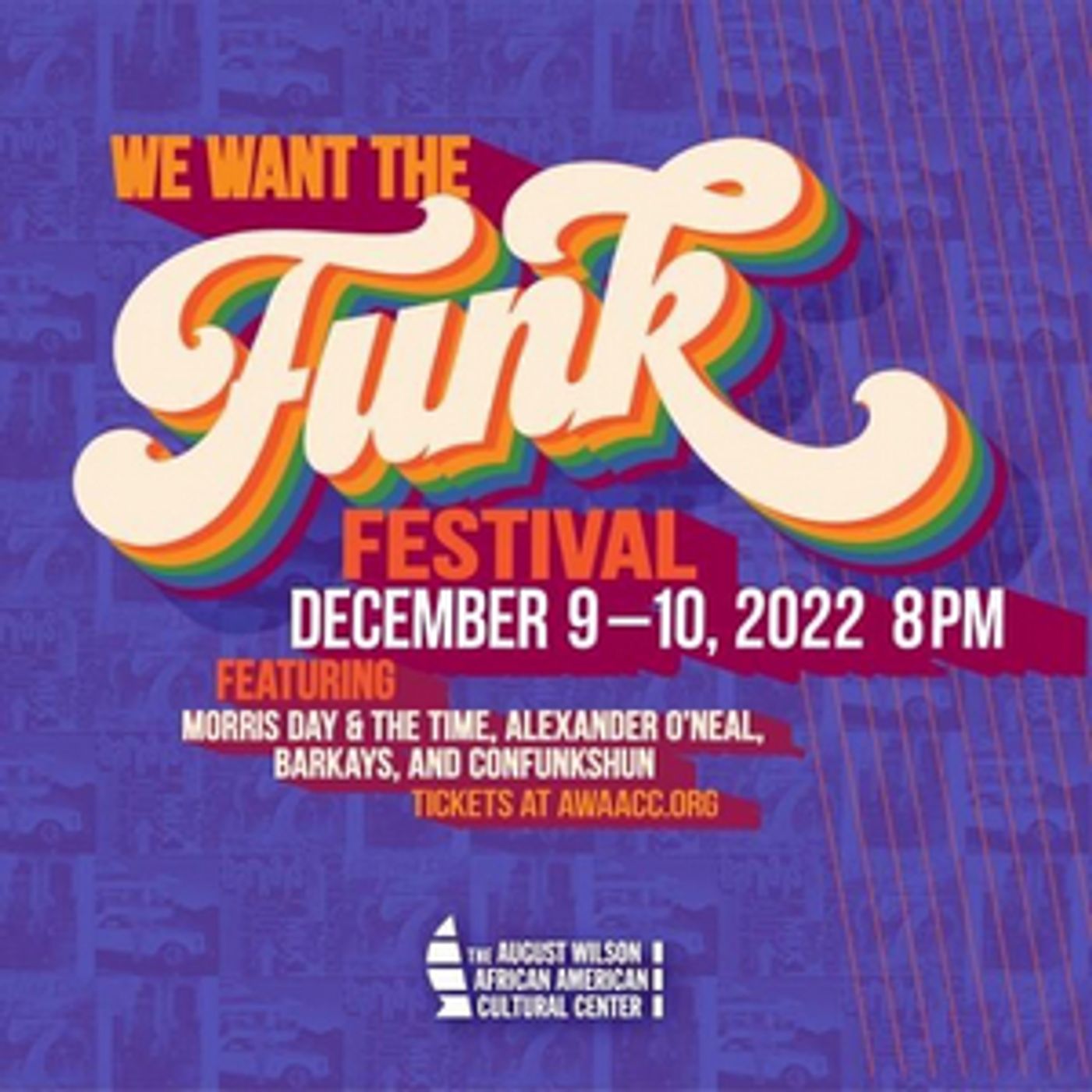August Wilson African American Cultural Center Presents WE WANT THE FUNK Festival Next Month
The festival runs December 9 and 10 at 8:00 pm.

The fourth annual We Want the Funk Festival, which takes place at the August Wilson African American Cultural Center (AWAACC) December 9 and 10 at 8:00 pm, celebrates the rhythm-driven musical genre that evolved from the R&B, soul, and jazz music of the 1960s that continues to influence today's artists. Featuring a dynamic host and lineup, the concerts include a variety of performers from chart-toppers to R&B-fusion groups to solo vocalists.
On Friday, December 9, the festival opens with two avatars of the Minneapolis Sound, Morris Day & The Time and Alexander O'Neal. Since the mid-80's, Mississippi-born, singer O'Neal has reigned supreme as a premier vocalist of that sound. Blessed with a down-home, up-south tenor voice equally at home with the Saturday Night Function and the Sunday Morning Church Service, O'Neal's 11 Top-40 R&B hits from nearly a dozen albums included the quiet storm classic, "If You Were Here Tonight," the moving, mid-tempo "All True Man" and the club favorite "Fake." Plus, there are the immortal duets O'Neal sang with Cherrelle, "Never Knew Love Like This," and "Saturday Love."
O'Neal's hits were produced by keyboardist Jimmy Jam and bassist Terry Lewis, who were band mates in a local Minneapolis group called Flyte Tyme, which included keyboardist Monte Moir. O'Neal, Jam, Lewis and Moir teamed up with guitarist Jesse Johnson, drummer Jellybean Johnson, dancer Jerome Benton and vocalist Morris Day and re-formed as The Time in 1981. O'Neal left the Group, went solo, and Day replaced him as the lead singer. Known for their throwback, 40s-style clothes, cool, hipster choreography and funky tracks The Time has entertained generations of fans with their infectious dance hits "Give It Up," "777-9311," "Jungle Love," "Cool" and "The Bird." The group opened for Prince and Day appeared in Prince's film Purple Rain. Jam and Lewis left the group in 1983, and became one of the most successful, award-winning producers of the modern era. Mostly known for their work with Janet Jackson, Jam and Lewis also lent their magical musical touch to Janet's brother, Michael Jackson, The Human League, The SOS Band, Mariah Carey, Earth, Wind & Fire and many other stars. Day comes to Pittsburgh with a 21st century update of The Time that will bring the dance-funk they've delivered for decades - it will feel like you're at the First Avenue Club in Minneapolis, where it all began.
The festival continues on Saturday with two more stellar groups, ConFunkShun and The Bar-Kays.
Hailing from Memphis, The Bar-Kays were a group of Stax Records session musicians that became a band in 1964 and were one of the first groups in that era to merge soul, R&B and funk. They scored their first hit, "Soul Finger," three years later. The group was the backup band for Otis Redding, and tragically, four members of the band - guitarist Jimmie King, organist Ronnie Caldwell, saxophonist Phalon Jones and drummer Carl Cunningham - were killed with Redding when his plane crashed in 1967, with trumpeter Ben Carley as the sole survivor. The group re-formed, was featured in the 1973 documentary Wattstax, backed Isaac Hayes on his Hot Buttered Soul LP, and emerged in the 70's in full funk mode with the straight-haired flamboyant lead singer Larry Dodson. In that decade, the group produced their greatest funk hits, "Shake your Rump to the Funk," "Move Your Boogie Body," and their smash 1978 single, "Holy Ghost," whose percussive percolations anticipated DC go-go music, and remains a cookout classic to this day. Still going after six decades, their latest single, "Choosey Lover," featuring Jazze Pha, updates their classic funk sound with hip-hop beats, proving that they're still on the one.
In 1973, Stax also featured a group from Vallejo, California, named ConFunkShun, that moved to Memphis and worked as the backup to the group The Soul Children. Led by guitarist/vocalist Michael Cooper, who co-founded the group in 1969 with drummer/percussionist Louis A. McCall, Sr., ConFunkShun was signed to Mercury Records in 1976. With their signature, Bay Area brew of James Brown and Sly Stone, the group recorded a dozen albums, which yielded a number of hits including, "Ffun," "Sho Feels Good to Me," "Chase Me" and their quiet storm classic, "Love's Train," revived and reinterpreted by the Anderson .Paak/Bruno Mars duo, Silk Sonic. Just in time for the holidays, ConFunkShun recently released a compilation of seasonal music, Home for Christmas. Wit Cooper and Felton Pilate still at the helm of this timeless musical machine, the evening will bring nothing but "ffun" and fabulous funk.
Without a doubt, the We Want the Funk Festival proves that funk is timeless and is at home everywhere.
Ticket Prices each night are $55.00 - $65.00 and are available at www.awaacc.org.
The August Wilson African American Cultural Center is a non-profit cultural organization located in Pittsburgh's cultural district that generates artistic, educational, and community initiatives that advance the legacy of Pulitzer Prize-winning playwright August Wilson. One of the largest cultural centers in the country focused exclusively on the African American experience and the celebration of Black culture and the African diaspora, the non-profit organization welcomes more than 119,000 visitors locally and nationally. Through year-round programming across multiple genres, such as the annual Pittsburgh International Jazz Festival, Black Bottom Film Festival, AWCommunity Days, TRUTHSayers speaker series, and rotating art exhibits in its galleries, the Center provides a platform for established and emerging artists of color whose work reflects the universal issues of identity that Wilson tackled, and which still resonate today. www.awaacc.org
Videos

